第二模块作业1表单
- 格式:doc
- 大小:35.00 KB
- 文档页数:4
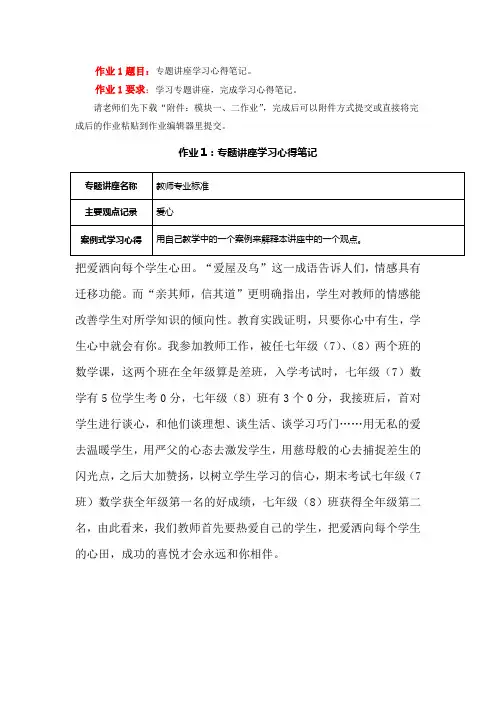
作业1题目:专题讲座学习心得笔记。
作业1要求:学习专题讲座,完成学习心得笔记。
请老师们先下载“附件:模块一、二作业”,完成后可以附件方式提交或直接将完成后的作业粘贴到作业编辑器里提交。
作业1:专题讲座学习心得笔记
把爱洒向每个学生心田。
“爱屋及乌”这一成语告诉人们,情感具有迁移功能。
而“亲其师,信其道”更明确指出,学生对教师的情感能改善学生对所学知识的倾向性。
教育实践证明,只要你心中有生,学生心中就会有你。
我参加教师工作,被任七年级(7)、(8)两个班的数学课,这两个班在全年级算是差班,入学考试时,七年级(7)数学有5位学生考0分,七年级(8)班有3个0分,我接班后,首对学生进行谈心,和他们谈理想、谈生活、谈学习巧门……用无私的爱去温暖学生,用严父的心态去激发学生,用慈母般的心去捕捉差生的闪光点,之后大加赞扬,以树立学生学习的信心,期末考试七年级(7班)数学获全年级第一名的好成绩,七年级(8)班获得全年级第二名,由此看来,我们教师首先要热爱自己的学生,把爱洒向每个学生的心田,成功的喜悦才会永远和你相伴。
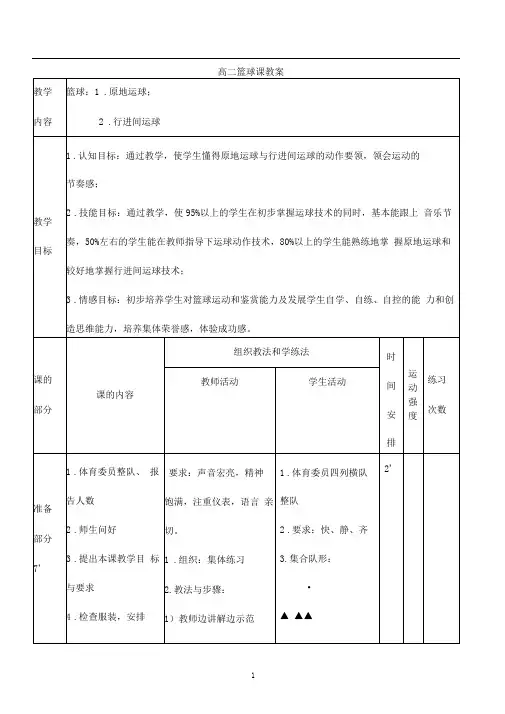
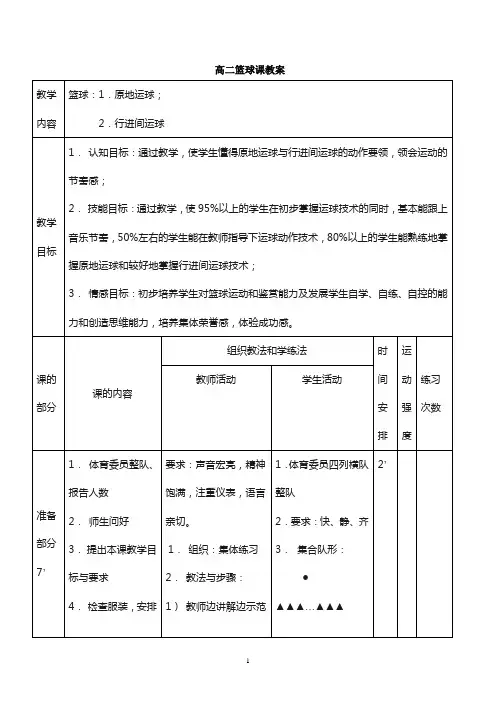
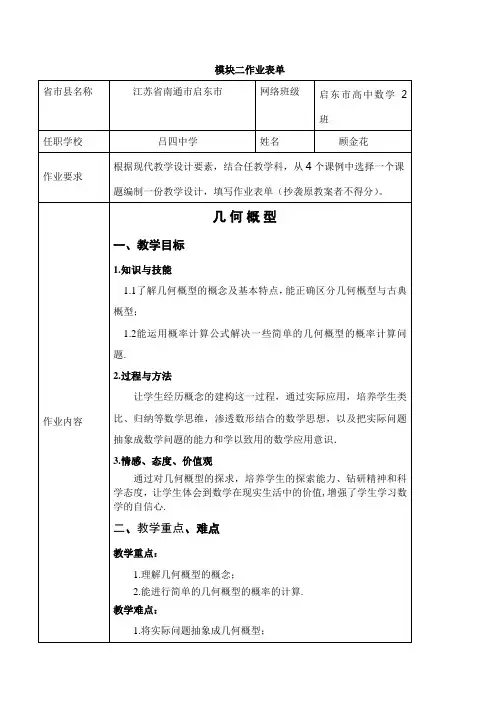
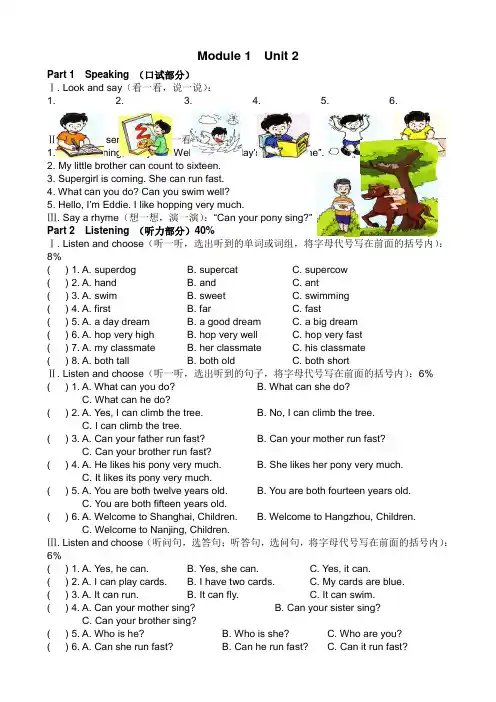
Module 1 Unit 2Part 1 Speaking (口试部分)Ⅰ. Look and say(看一看,说一说):1. 2. 3. 4. 5. 6.Ⅱ. Read the sentences(看一看,读一读):1. Good morning, everyone. Welcome to today’s “Super Time”.2. My little brother can count to sixteen.3. Supergirl is coming. She can run fast.4. What can you do? Can you swim well?5. Hello, I’m Eddie. I like hopping very much.Ⅲ. Say a rhyme(想一想,演一演):“Can your pony sing?”Part 2 Listening (听力部分)40%Ⅰ. Listen and choose(听一听,选出听到的单词或词组,将字母代号写在前面的括号内):8%( ) 1. A. superdog B. supercat C. supercow( ) 2. A. hand B. and C. ant( ) 3. A. swim B. sweet C. swimming( ) 4. A. first B. far C. fast( ) 5. A. a day dream B. a good dream C. a big dream( ) 6. A. hop very high B. hop very well C. hop very fast( ) 7. A. my classmate B. her classmate C. his classmate( ) 8. A. both tall B. both old C. both shortⅡ. Listen and choose(听一听,选出听到的句子,将字母代号写在前面的括号内):6% ( ) 1. A. What can you do? B. What can she do?C. What can he do?( ) 2. A. Yes, I can climb the tree. B. No, I can climb the tree.C. I can climb the tree.( ) 3. A. Can your father run fast? B. Can your mother run fast?C. Can your brother run fast?( ) 4. A. He likes his pony very much. B. She likes her pony very much.C. It likes its pony very much.( ) 5. A. You are both twelve years old. B. You are both fourteen years old.C. You are both fifteen years old.( ) 6. A. Welcome to Shanghai, Children. B. Welcome to Hangzhou, Children.C. Welcome to Nanjing, Children.Ⅲ. Listen and choose(听问句,选答句;听答句,选问句,将字母代号写在前面的括号内):6%( ) 1. A. Yes, he can. B. Yes, she can. C. Yes, it can.( ) 2. A. I can play cards. B. I have two cards. C. My cards are blue.( ) 3. A. It can run. B. It can fly. C. It can swim.( ) 4. A. Can your mother sing? B. Can your sister sing?C. Can your brother sing?( ) 5. A. Who is he? B. Who is she? C. Who are you?( ) 6. A. Can she run fast? B. Can he run fast? C. Can it run fast?Ⅳ. Listen and number(听一听,用“1---6”给下列图片编号):6%( ) ( ) ( ) ( ) ( ) ( ) Ⅴ. Listen and choose(听小对话和问题,选出正确的答案,将字母代号写在前面的括号内):4%( ) 1. A. Run very fast. B. Swim very well. C. Fly very high.( ) 2. A. Draw a monkey. B. Draw a bear. C. Draw a tiger.( ) 3. A. Jill is. B. Alice is. C. Kitty is.( ) 4. A. He can jump. B. He can run. C. He can swing.Ⅵ. Listen and fill in the blanks(听一听,填入所缺的单词完成短文,每线一词):5% Sam is a dog. It’s big and white. It can run __________. It likes to eat meat. It likes to play with a red __________. Judy is a rabbit. It’s white, too. It’s __________ small. Its ears are long and it has two red eyes. It can __________ well, but it can’t run fast. It likes to eat carrots. Sam and Judy __________ good friends. They are our animal friends, too.Ⅶ. Listen and choose(听对话,选择最佳答案,将字母代号写在前面的括号内):5% ( ) 1. There is a __________ in Tom’s hand.A. catB. bagC. cake( ) 2. Billy is __________ friend.A. Tom’sB. Jim’sC. Tim’s( ) 3. Billy is not _____________.A. tallB. shortC. fat( ) 4. Billy likes __________.A. tigersB. bearsC. pandas( ) 5. Billy can’t __________ well.A. singB. swimC. dancePart 3 Reading and writing(阅读部分)60%Ⅰ. Copy the words and sentences(正确抄写下列单词、词组和句子,抄写句子时注意大小写和标点符号):6%Supergirl these monkey a dream interview both tall play a game__________________________________________________________________ can your grandfather draw three fat tigers yes he can__________________________________________________________________Ⅱ. Look and write(根据图意,写出合适的单词完成句子,每线一词,首字母已给):6% 1. 2. 3. 4. 5. 6.1. --- What can you do? --- I can p__________ a house.2. Hello, I am Li Hong. I can j__________.3. Look at the Supergirl. She c__________ write.4. --- Can the b__________ play basketball? --- Yes, he can.5. --- What can you do? --- I can sing a__________ dance.6. Look, the little w__________ are on the crisps. Please go away.Ⅲ. Read and judge(判断下列各组单词划线部分的发音,用“T”或“F”表示):5%1. 2. 3. 4. 5.de sk ma sk wa sp cris ps d a nce p ai nt sw i m wr i te r ea d r e dⅣ. Read and write(读一读,写出相应的单词,每线一词):5%1. A bird __________ fly, and it __________ sing, too. It’s super.2. I __________ climb the tree, but(但是)I can draw a tree.3. Supergirl is super. She can __________, __________ and so on.3. Superdog is big. It’s __________. It’s __________. I like it very much.4. A dolphin(海豚)__________ run, but it ___________ jump very high.5. Liu Xiang can run very __________. He likes ____________.Ⅴ.Choose the best answer(选择最佳答案,将字母代号写在前面的括号内):( ) 1. She can run very __________.A. muchB. fastC. good( ) 2. My classmates can swim __________ ice-skate.A. andB. butC. too( ) 3. Can ___________ brother sing and dance?A. youB. yourC. you’re( ) 4. I like __________English books.A. readB. readsC. reading( ) 5. This __________ our good friend.A. isB. amC. are( ) 6. Danny and Kitty are __________ super.A. twoB. bothC. to( ) 7. The __________can’t swim.A. hensB. ducksC. frogs( ) 8. --- _________ is he? --- He’s Peter.A. HowB. WhatC. WhoⅥ. Rewrite the sentences(按要求改写下列句子,每线一词):10%1. It’s a fish. It’s Eddie’s.(合并成一句)It’s __________ __________.2. They can paint two dogs.(根据划线提问)________ ________ they ________?3. He can climb the tree.(改为一般疑问句)__________ he ________ the tree?4. The rabbit can jump.(改为否定句)The rabbit _________ _________.5. What can you do?(根据实际回答)I __________ __________.Ⅶ括号内):4%((( ) 3. I __________ a teacher. I have a new book.( ) 4. Her name __________Tracy. She likes apples very much.Ⅷ. Read and choose(读一读,选择合适的应答句,将字母代号写在前面的括号内):6% ( ) 1. Can your cat swim? A. Yes, he can.( ) 2. Can your sister swim? B. Yes, it can.( ) 3. What can you do? C. I can swim.( ) 4. Can your brother swim? D. Yes, she can.( ) 5. Can your classmates swim? E. Yes, I can.( ) 6. Can you swim? F. Yes, they can.Ⅸ. Read and judge(阅读短文,判断正误,用T或F表示):5%This is my friend. Her name is Supergirl. She has long hair. It’s black. Her eyes are big and her nose is small. She can run very fast. She can swim and dive, too. She can fly very high in the sky. But she can not write. She is afraid(害怕)of writing. She can’t swim well. She has a dog. His name is Superdog. He’s brown. He’s big. He can fly in the sky, too. Helikes eating meat(肉). But he doesn’t like eating fish. Superdog can help Supergirl. They are good friends.( ) 1. Supergirl ‘s hair isn’t short.( ) 2. She has two big ears.( ) 3. She can’t swim.( ) 4. Superdog is Supergirl’s friend.( ) 5. The blue dog can fly in the sky.Ⅹ. Write at least 5 sentences(请说说你的同桌,可以说说年龄、身高、能力、喜欢的事情等等,至少5句,要求2-3种句型):5%My deskmate________________________________________________________________________________________________________________________________________________________________________Module 1 Unit 2Part 2 Listening (听力部分)Ⅰ. Listen and choose(听一听,选出听到的单词或词组,将字母代号写在前面的括号内):1. I can draw a supercow. It can fly.2. Danny is twelve and he can read English.3. Do you like swimming in the sea?4. Look, Liu Xiang can run very fast.5. Don’t make a day dream.6. The little girl can hop very high.7. Her classmate is in the playground.8. My grandfather and my father are both tall.(1. C 2. B 3. C 4. C 5. A 6. A 7. B 8. A)Ⅱ. Listen and choose(听一听,选出听到的句子,将字母代号写在前面的括号内):1. What can you do?2. No, I can climb the tree.3. Can your brother run fast?4. She likes her pony very much.5. You are both twelve years old.6. Welcome to Nanjing, Children.(1. A 2. B 3. C 4. B 5. A 6. C)Ⅲ. Listen and choose(听问句,选答句;听答句,选问句,将字母代号写在前面的括号内):1. Can your mother ride a bicycle?2. What can you do?3. What can a bird do?4. Yes, he can.5. I am Supergirl.6. No, she can’t.(1. B 2. A 3. B 4. C 5. C 6. A)Ⅳ. Listen and number(听一听,用“1---6”给下列图片编号)1. --- What can you do? --- I can write.2. --- Can you read a book? --- Yes, I can.3. --- What can you do? --- I can paint a picture.4. --- Can you jump? --- Yes, I can jump high.5. --- Where are you? --- I am in the sea. I can swim.6. --- Can you draw a flower? --- No, I can draw a house.(564123)Ⅴ. Listen and choose(听小对话和问题,选出正确的答案,将字母代号写在前面的括号内):1. A: Can you fly very high?B: No, but a bird can very high.A: Can you swim well?B: No, I can’t. But a fish can swim well.A: Can you run very fast?B: No, but a dog can run very fast.Q: What can a bird do?2. A: Can you draw a tiger, Eddie?B: No, I can’t.A: Can you draw a bear?B: No, I can’t.A: What can you do?B: I can draw a monkey. It’s lovely.Q: What can Eddie draw?3. A: Where are the girls?B: Jill is in the classroom. She is a tall girl. She likes drawing pictures. Kitty is in the playground. She likes playing basketball. Alice is in the library. She can read books.A: Are they good friends?B: Yes, they are.Q: Who is in the playground?4. A: Who are the boys?B: Eddie is a short boy. He can jump. Ben is a tall boy. He can run. Danny is a fat boy. He can swing.A: Where are they?B: They are in the playground.Q: What can Ben do?(1. C 2. A 3. C 4. B)Ⅵ. Listen and fill in the blanks(听一听,填入所缺的单词完成短文,每线一词):Sam is a dog. It’s big and white. It can run fast. It likes to eat meat. It likes to play with a red ball. Judy is a rabbit. It’s white, too. It’s very small. Its ears are long and it has two red eyes. It can jump well, but it can’t run fast. It likes to eat carrots. Sam and Judy are good friends. They are our animal friends, too.(1. fast 2. ball 3. very 4. jump 5. are)Ⅶ. Listen and choose(听对话,选择最佳答案,将字母代号写在前面的括号内):J im: Hello, Tom. What’s in your hand?Tom: Oh, a birthday cake.Jim: Happy birthday to you.To m: Sorry, it’s not my birthday. Today is my friend’s birthday.Jim: What’s your friend’s name?Tom: His name is Billy.Jim: Is he tall?Tom: Yes, he is tall and fat.Jim: Is he a student?Tom: No, he is a teacher.Jim: What can he do?Tom: He can dive, paint, sing and dance.Jim: Can he swim well?Tom: No, he can’t.Jim: Does he like animals?Tom: Yes, he likes pandas very much.(1. C 2. A 3. B 4. C 5. B)Part 3 Reading and writing(阅读部分)Ⅰ. Supergirl these monkey a dream interview both tall play a game Can your grandfather draw three fat tigers? Yes, he can.Ⅱ. 1. paint 2. jump 3. can’t 4. boy 5. and 6. waspsⅢ. 1. T 2. F 3. F 4. F 5. FⅣ. OmittedⅤ. 1. B 2. A 3. B 4. C 5. A 6. B 7. A 8. CⅥ. 1. Eddie’s, fish 2. What, can, do 3. Can, clime 4. can’t, jump 5. can, …Ⅶ. 1. D 2. B 3. A 4. CⅧ. 1. B 2. D 3. C 4. A 5. F 6. EⅨ. 1. T 2. F 3. F 4. T 5. FⅩ. Omitted。
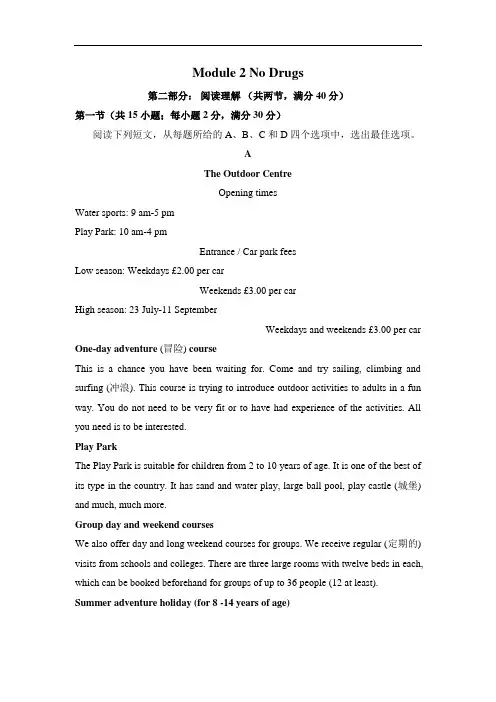
Module 2 No Drugs第二部分:阅读理解(共两节,满分40分)第一节(共15小题;每小题2分,满分30分)阅读下列短文,从每题所给的A、B、C和D四个选项中,选出最佳选项。
AThe Outdoor CentreOpening timesWater sports: 9 am-5 pmPlay Park: 10 am-4 pmEntrance / Car park feesLow season: Weekdays £2.00 per carWeekends £3.00 per carHigh season: 23 July-11 SeptemberWeekdays and weekends £3.00 per car One-day adventure (冒险) courseThis is a chance you have been waiting for. Come and try sailing, climbing and surfing (冲浪). This course is trying to introduce outdoor activities to adults in a fun way. You do not need to be very fit or to have had experience of the activities. All you need is to be interested.Play ParkThe Play Park is suitable for children from 2 to 10 years of age. It is one of the best of its type in the country. It has sand and water play, large ball pool, play castle (城堡) and much, much more.Group day and weekend coursesWe also offer day and long weekend courses for groups. We receive regular (定期的) visits from schools and colleges. There are three large rooms with twelve beds in each, which can be booked beforehand for groups of up to 36 people (12 at least). Summer adventure holiday (for 8 -14 years of age)Safety is of great importance at the Outdoor Centre. All our workers are fully trained in first aid (急救), and able to teach the activities on offer. We also make certain that all children only take part in activities that are suitable for their age and physical abilities. For this programme children must be able to swim 25 metres and be in good physical health.21. How much should a family driving two cars pay when entering the centre in August?A. £2.00.B. £3.00.C. £4.00.D. £6.00.22. Which of the following is suitable for a group of ten children aged 6 to 8?A. Play Park.B. One-day adventure course.C. Summer adventure holiday.D. Group day and weekend courses.23. People who want to take the summer adventure holiday _____.A. can stay overnight if they wantB. should have basic skills in swimmingC. should have a knowledge of first aidD. can do any sport they are interested inBAmerican runner Meb Keflezighi thought that he had retired (退役). But he had one more task. At the age of 42, he ran the 2018 Boston Marathon (波士顿马拉松) to raise money for the Martin Richard Foundation (MRF). The organization, created by Martin’s parents, honors the memory of the eight-year-old boy who was killed in the terrorist attack (恐怖袭击) at the 2013 Boston Marathon.Born in Eritrea, a country in the Horn of Africa, Keflezighi has had to deal with many difficulties from the time he was growing up. “No running water, noelectricity,” he said. “You had to go two, th ree miles to get wood so that you could have fire to cook.”For Keflezighi, running has always been a way of life. “It’s what I love to do, and it’s who I am,” he said. Keflezighi won the 2014 Boston Marathon and the 2009 New York City Marathon, and got a silver medal (奖牌) at the 2004 Summer Games in Athens, Greece.Keflezighi retired from competition after the 2016 New York City Marathon. But he decided to run one last race. “I’m happy with my achievements,” he said. “Now, I’ll help others reach their goals.”On the morning of April 16, Keflezighi set out from the starting line with more than 27,000 other marathoners. They raced through Boston’s hilly streets, heavy winds and cold rain. Those were “the most difficult conditions I’ve ever run in,” Keflezighi said after the race.Keflezighi finished in 3 hours and 13 seconds, nearly an hour slower than his winning time at the 2014 Boston Marathon. But this year, Keflezighi was running not for the prize, but for a cause.“Marathon Meb”, as he is called, is still inspiring ot hers. He said. “We all have difficult situations, but as long as we can overcome those, there’s the finish line waiting for us.”24. Why did Keflezighi run another race after he had decided to retire?A. To raise money for an organization.B. To express th ankfulness to Martin’s parents.C. To try running in the most difficult conditions.D. To encourage people to face difficulties bravely.25. How was Meb Keflezighi’s life like as a child?A. Hard.B. Lonely.C. Exciting.D. Peaceful.26. What can we learn about the 2018 Boston Marathon?A. It was supported by MRF.B. It was held in very bad weather.C. Keflezighi broke his own record at this race.D. Keflezighi decided to run another race after this one.27. What does the underlined word “inspiring” in the last paragraph mean?A. Helping.B. Training.C. Questioning.D. Encouraging.COne of the major problems facing nursing homes is that patients don’t move around enough. All too often the elderly end up sitting and looking at a wall or into a television. They’re usually not motivated (有积极性的) to exercise, partly because getting moving again after a long period of inactivity can cause pain, and partly because it’s not interesting to sit and look at a wal l while you bike.A new research project from Aalborg University in Denmark may have the solution: virtual reality (VR). The project, led by Jon Ram Bruun-Pedersen, uses the technology to get the elderly on exercise bikes, thus turning exercise into a virtual experience.In Bruun-Pedersen’s study, large TV screens were set up in front of the exercise bikes in the nursing home’s activity room. While they biked, the 21 seniors rode through various virtual landscapes (风景) on the TV screen. The bikes were connected with the screens so the speed the subjects biked with was related to their speed through the landscape.“The study showed that seniors were happy with the experience and really lived it,” says Bruun-Pedersen. “They felt as if they had to ride harder to get up the hill on the screen.”Next, the elderly subjects wore VR glasses with small screens in front of their eyes. The feeling is very true to life, and the elderly subjects vividly (逼真地) experienced being out in the great outdoors — even though they were still on an exercise bike in the activity room.“We set the study up so the elderly could ride in the same landscapes they knew from the screens. They took to the experience amazingly well,” Bruun-Pedersen said. “The seniors’ desire to use the exercise bikes greatly increased.”“This is really good,” he says. “Partly because it’s good for them physically to move more, but also because I wanted them to experience getting out in the world —even if it’s a virtual world.”28. According to the text, what is a reason why the elderly seldom move around?A. They are not in good health.B. They are afraid of getting hurt.C. Doing exercise may be painful.D. It’s more interesting to watch TV.29. What can we infer about the seniors’ experience in Bruun-Pedersen’s study?A. The VR glasses helped them bike easier and faster.B. They tried to avoid moving around in the outdoors.C. They had to ride harder when climbing a virtual hill.D. The faster they biked the quicker they traveled on screen.30. What did the subjects of the study think of their virtual cycling tour?A. Enjoyable.B. Dangerous.C. Relaxing.D. Tiring.31. How is the text mainly developed?A. By giving examples.B. By making comparisons.C. By asking questions and answering them.D. By raising a problem and offering the solution.DIceland is known for its wonderful ice fields and it has one of the best places in the world to see the Northern Lights. However, in the late 1990s, Iceland was also known as a country with one of the highest numbers of teen drug abuse (滥用) in Europe. “There were large groups of teenagers getting hopelessly drunk,” American researcher Harvey Milkman said.Noticing their teenagers were out of control, the country decided to do something. With the help of researchers including Harvey Milkman, the government began a special experiment, helping teenagers stay away from drugs. The program, called Youth Iceland, tried to give teens more meaningful and enjoyable things to do. It made kids feel like they were part of something. It also encouraged parents to make time for their children and to actively take part in their lives.The government spent millions of dollars to support new programs for sports, music, arts and dance. Low-income (低收入的) families —who couldn’t afford to sign their kids up for sports programs or art classes — were given a special card of $325 a year. This made it possible for those parents to take part in after-class activities with their children. Besides, kids between the ages of 13 and 16 were not allowed to go outside after 10 p.m. in winter or after midnight in summer.Today, Iceland has the lowest rate (比率) of teen drug abuse in Europe. In 1998, before Youth Iceland, 42% of 15- and 16-year-olds reported getting drunk. Last year, that number had dropped to 5%. Those smoking cigarettes dropped from 23% to 3%. At the same time, the percentage of those spending time with their parents on weekdays doubled, from 23% to 46%, and the percentage taking part in organized sports at least four days a week jumped from 24% to 42%.32. What can we infer about the problems mentioned in Paragraph 1?A. They were quite serious.B. They were hard to notice.C. They were easy to deal with.D. They were common in Europe.33. What’s the purpose of Youth Iceland?A. To test a new program.B. To prevent teen drug use.C. To win support from parents.D. To give teens more free time.34. What is the use of the special card?A. To help poor families live a better life.B. To encourage poor families to do after-class activities.C. To make sure kids feel like they were part of something.D. To provide kids from poor families with formal education.35. What do the numbers in the last paragraph show?A. The program proves to be a success.B. It is important to help teens develop good habits.C. Teens in Iceland are well under control nowadays.D. The problem of teen drug abuse in Iceland is serious.第二节(共5小题;每小题2分,满分10分)根据短文内容,从短文后的选项中选出能填入空白处的最佳选项。
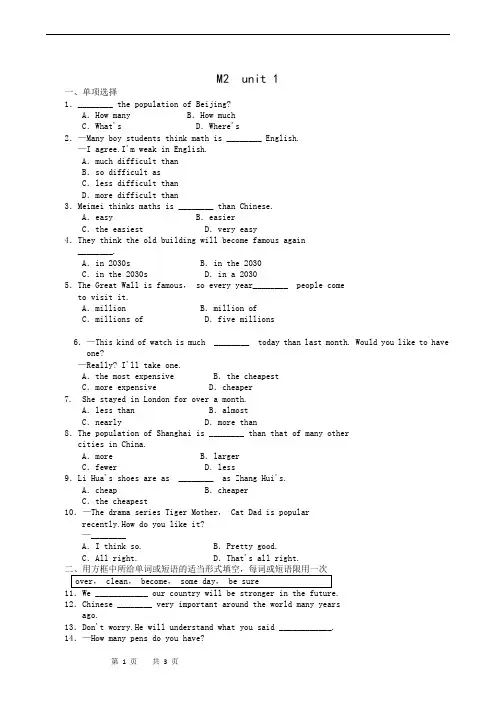
M2 unit 1一、单项选择1.________ the population of Beijing?A.How many B.How muchC.What's D.Where's2.—Many boy students think math is ________ English.—I agree.I'm weak in English.A.much difficult thanB.so difficult asC.less difficult thanD.more difficult than3.Meimei thinks maths is ________ than Chinese.A.easy B.easierC.the easiest D.very easy4.They think the old building will become famous again________.A.in 2030s B.in the 2030C.in the 2030s D.in a 20305.The Great Wall is famous, so every year________ people cometo visit it.A.million B.million ofC.millions of D.five millions6.—This kind of watch is much ________ today than last month. Would you like to have one?—Really? I'll take one.A.the most expensive B.the cheapestC.more expensive D.cheaper7. She stayed in London for over a month.A.less than B.almostC.nearly D.more than8.The population of Shanghai is ________ than that of many othercities in China.A.more B.largerC.fewer D.less9.Li Hua's shoes are as ________ as Zhang Hui's.A.cheap B.cheaperC.the cheapest10.—The drama series Tiger Mother, Cat Dad is popularrecently.How do you like it?—________A.I think so. B.Pretty good.C.All right. D.That's all right.12.Chinese ________ very important around the world many yearsago.13.Don't worry.He will understand what you said ____________.14.—How many pens do you have?—________ ten.15.He tidied his bedroom just now.It is ________ than before.三、用所给词的适当形式填空16.This city has a population of about thirteen ________(million).17.Remember __________ (finish) your homework this weekend.18. —Is this city ________ (hot) than that one?—No, it isn't.19.Are there any other ________ (question)?20. Miss Liu is very ________ (busy), but her husband is ________(busy) than her.四、根据所给汉语提示完成句子21.去年的某一天我在街上遇到他了。